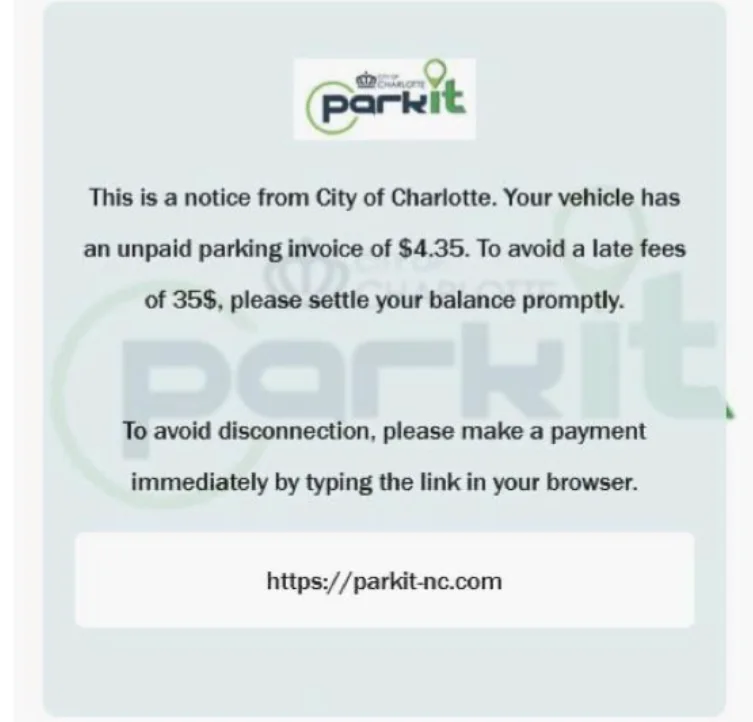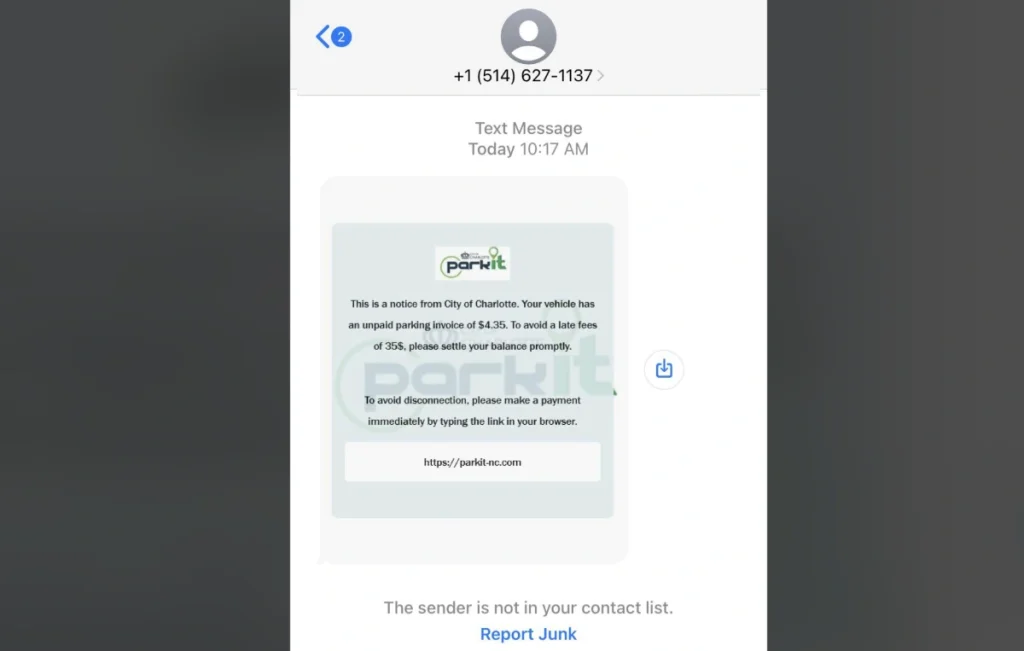ParkIt Charlotte Text Scam targets drivers by sending fake parking fine messages. Let’s break it down and see how it works, what warning signs to watch for, and what you can do if you’ve been tricked.
What is the ParkIt Charlotte Text SCAM?
The scam starts with a text message that looks like it’s from the City of Charlotte. It says you owe a small parking fine, usually about $4.30.
The message warns you that if you don’t pay right away, you’ll be charged a big late fee of $35. It includes a link to a website—parkit-nc.com—and urges you to pay immediately.
At first, the text seems real, especially if you recently parked in Charlotte. But it’s a sneaky trick. The scammers use clever wording to make it seem official, but there are clues that give them away.
The text uses strange language that feels off. For example, it says “late fees” in an odd way, and the grammar isn’t professional. It even claims you’ll be “disconnected” if you don’t pay, which doesn’t make sense for a parking fine. Parking authorities don’t use terms like that.
The link in the message is another problem. It might look like a real website, but it’s actually a fake page designed to steal your personal information. Small details, like a misspelled website name or the lack of secure “https,” show that it’s not official.
Also, the text comes from a phone number in Montreal, Canada, instead of a Charlotte-area number. That’s a big warning sign.

Our Review
This scam is a good example of why it’s important to stay alert. The ParkIt Charlotte Text Scam uses tricks like urgency and authority to pressure people into paying quickly.
The small fine amount—$4.30—makes it seem harmless, but it’s part of the scammers’ plan to make you act without thinking.
Real parking authorities in Charlotte don’t send random text messages asking for money. They use official websites or apps to handle parking tickets. The poor grammar, odd terms, and foreign phone number all make it clear that this message isn’t from a trusted source.
Scammers often rely on people not noticing these red flags. They hope you’ll be in a hurry and not double-check the details. But by staying cautious, you can avoid falling for their tricks.
If you ever get a message like this, don’t click the link. Instead, contact the official parking authorities in Charlotte to confirm if the claim is real. This can save you from losing money or giving away personal information.
What to Do If You’re Scammed
If you’ve already clicked the link or shared your information, act quickly. Contact your bank or credit card company right away to secure your account. Let them know what happened and ask for help stopping any unauthorized transactions.
You should also report the scam to local authorities or consumer protection agencies. Share the phone number or link you received so they can take action against the scammers.
Finally, keep an eye on your bank accounts and credit reports for unusual activity. Using two-factor authentication (2FA) can help protect your accounts in the future. By staying alert and taking these steps, you can reduce the impact of the scam and protect yourself moving forward.
Honey, a browser extension, claims to help you save by applying coupon codes at checkout.









3 Comments
Pingback: Monterax.com Review: Is This Platform Legit for Cryptocurrency Trading? - LegitRant
Pingback: Wartogs.com Review: Is This Cryptocurrency Exchange Legit? - LegitRant
Pingback: Fenovax.com Review: Is This Crypto Exchange Trustworthy? - LegitRant